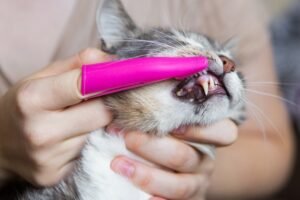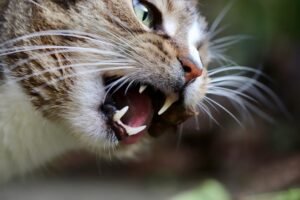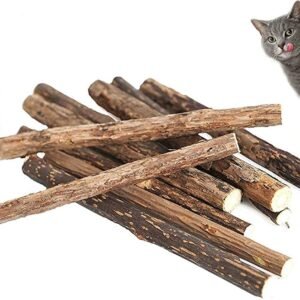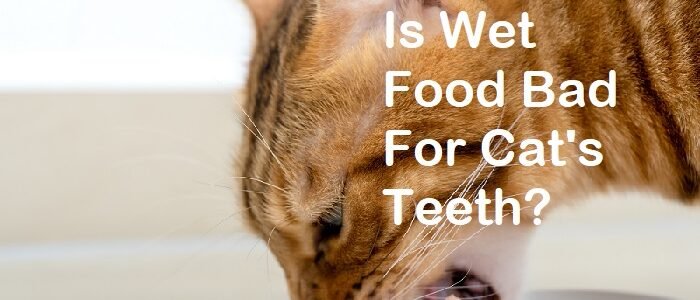Although cats do not show signs of oral discomfort, paying proper attention to your cat’s dental health is vital. So, is wet food bad for cats teeth? This article addresses the dental health of cats and the meals your cat can eat.
Cats may put up some abnormal misbehaviors such as dropping food and head shyness. These acts could indicate that your cat is experiencing a dental problem.
Several factors may influence the risk of cats developing dental health issues. So you must pay utmost attention to your cat’s oral health for overall well-being.
So before we answer the question, is wet food bad for a cat’s teeth? First, let’s take a brief look at their dental structure.
Understanding the cat’s dental structure

The cat’s teeth are mainly designed for holding and killing small prey animals. Therefore, they are not very efficient in chewing and grinding food.
The cat’s upper and lower jaw has three pairs of incisors and elongated and laterally compressed canine teeth.
The cat uses it for grooming and tearing the prey, while the canines are designed for grasping and killing. Cats have three pairs of upper and two pairs of lower premolars.
It also has one pair of upper premolars and another pair of lower premolars. The back molars are typically flat and are used for cutting food into small pieces before swallowing.
Cats rarely use their molars for masticating food as they are known for consuming bites of food with little or no chewing.
Diet and oral health in cats
One main dental issue cat experiences are periodontal disease or gum disease. Cat’s periodontal diseases begin with saliva, food, and bacteria accumulating on the surface of the teeth and forming a sticky substance known as plaque.
This causes gum irritation that can lead to an inflammatory condition called gingivitis. Gingivitis is a condition associated with the reddening of the gums directly bordering the teeth.
As the condition advances, the cat will have moderate to severe redness in their gums, irregular gum surfaces and plaque, and calculus under their gums.
Other symptoms of gingivitis are bad breath, difficulty eating, and extensive loss of teeth due to the destruction of the structures that support them.
Wet food Vs. Dry food
Wet food is canned food, usually pre-measured. They contain real meat and vegetables with high amounts of water.
The high moisture content of wet food helps keep your cat from getting thirsty, which is suitable for dealing with kidney and urinary tract problems.
On the other hand, dry food refers to processed food that comes in large packages and is mainly purchased from supermarkets. Dry cat food has a higher amount of carbohydrates than wet food.
· Is wet food bad for cats teeth?
One general misconception held by many cat lovers is that wet food is bad for cats’ teeth.
Although most experts recommend dry food for good dental health in cats, no evidence suggests that wet food is bad for your cat’s oral health.
The high moisture content in wet food, such as raw meat, may help the surface of the teeth during gnawing and chewing. This action helps in preventing the accumulation of plaque and tartar.
So, feeding your cat raw meaty bones is equivalent to standard dental brushing and cleaning.
· Is dry food better than wet food for a cat’s teeth?
Some experts believe dry food is better for a cat’s teeth than wet food. Their submission goes that dry food leaves minimal residue in the mouth for oral bacteria to feed on, leading to a slow rate of plaque accumulation.
This thought also suggests that chewing dry food helps clean debris from the cat’s teeth, reducing dental health issues.
In reality, most cats do not necessarily chew dry food; they swallow it whole. Cats would need to contract their teeth to affect tartar accumulation.
A Factor predisposing cats to dental health problems

Aside from diet, tooth alignment can predispose cats to oral health issues.
Tooth alignment
The position or alignment of your cat’s teeth may predispose them to dental problems.
Cats with abnormally positioned teeth are more likely to suffer plaque and tartar build-up.
The reason is that misaligned teeth are not cleaned by the natural abrasion that occurs when food is eaten and chewed.
The following are reasons for misalignment in the cat’s teeth;
- Breed: Cat breeds such as Chinchillas, British and Exotic breeds are known for having poorly aligned teeth.
- Genetic abnormalities and trauma: A cat’s jaws may have an abnormal shape due to congenital abnormality or possibly due to trauma.
- Deciduous tooth retention: Some cats may have deciduous teeth (milk teeth) that remain retained after the permanent teeth erupt.
- Infectious disease: This is due to several infectious diseases, such as feline immunodeficiency virus (FIV) infection and feline leukemia virus (FeLV) infection, or feline calicivirus (FCV). FIV and FeLV can predispose cats to periodontal disease and gingivitis.
Wet food vs. Dry Food: Which is best for my cat’s dental health?
The main difference between wet and dry food is the moisture content. Cats need a good amount of moisture for their overall well-being.
Similarly, wet food such as raw meat may help with dental problems. Therefore, ensure you choose high-quality wet food for feeding your cat at all times.
Tips for managing your cat’s dental health
 Your cat, as a carnivore, requires clean, strong, and sharp teeth. As a result, the following tips are vital for your cat’s oral health;
Your cat, as a carnivore, requires clean, strong, and sharp teeth. As a result, the following tips are vital for your cat’s oral health;
- Ensure you take your cats for periodic dental checks. Your vet would conduct a detailed oral exam and x -rays to identify possible issues under the gum line. A complete cleaning under your cat’s gum line may be carried out to prevent periodontal disease. Your vet may also perform a scaling exercise to remove plaque and tartar accumulation on the crown.
- Brush your cat’s teeth regularly. Ensure you use the toothpaste and a toothbrush designed for cats.
- Provide your cat with a chew toy designed to help with pet dental hygiene.
Final Thoughts- Is wet food bad for cats teeth?
No evidence suggests that wet food is bad for cats’ teeth. While wet food may have shortcomings, it helps improve your feline friend’s overall health and well-being.

